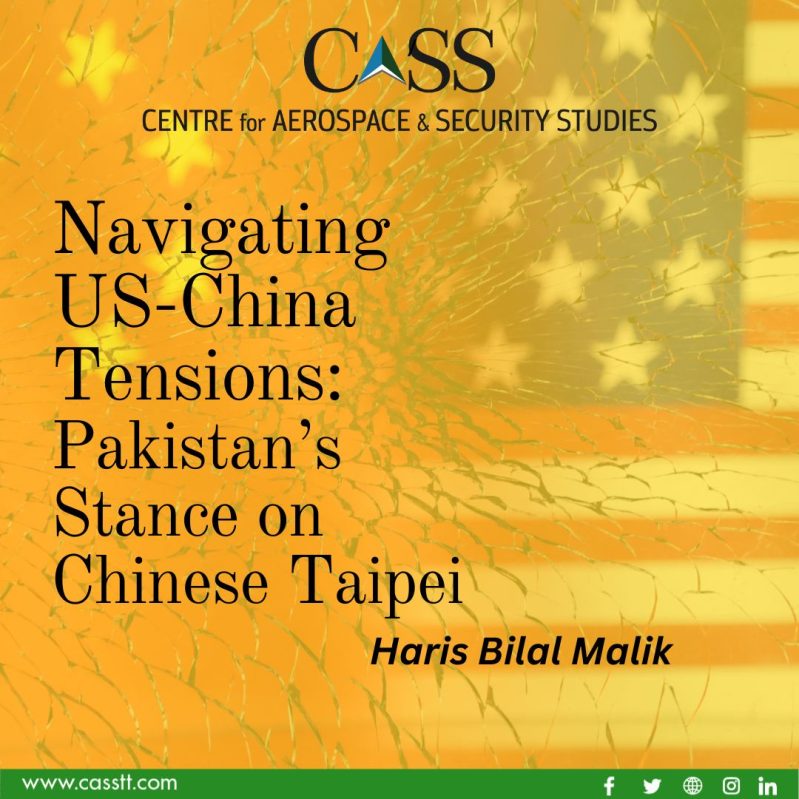The Taiwan Strait has become an increasingly contentious flashpoint in the ongoing tensions between China and the United States (US). China firmly asserts that the region is an integral part of its territory, guided by its ‘One China Principle,’ while the US policy is guided by the Taiwan Relations Act (TRA) enacted in 1979, which governs the unofficial relationship between the Washington and Taiwan. Under the TRA, the US is committed to enabling ‘Taiwan to maintain a sufficient self-defense capacity’, including defence articles and services. This fundamental disagreement has heightened the geopolitical rivalry between the two countries. Situated at the heart of the Indo-Pacific region, Chinese Taipei’s strategic significance has amplified its importance as a focal point in the power competition between the US and China.
In recent months, tensions escalated rapidly. China strongly reacted to high-level US engagements following the unprecedented military exercises and diplomatic measures during then-Speaker Nancy Pelosi’s visit in August 2022, which led to the ‘Fourth Taiwan Strait Crisis’. Subsequently, Taiwanese President Tsai Ing-wen’s transit through the US, and subsequent meeting with Speaker of the House Kevin McCarthy further exacerbated the situation. In response, the Chinese People’s Liberation Army (PLA) intensified its military activities, particularly following the McCarthy meeting. The PLA initiated large-scale military exercises around the Taiwan Strait, surpassing previous responses to presidential transits. These developments highlight the delicate nature of the Taiwan-China relationship and the potential impact of escalating tensions on regional and international security.
Given the gravity of these dynamics, it becomes imperative for Pakistan to carefully assess its position, taking into account its national interests, regional stability, and global dynamics. Navigating this potentially volatile situation requires a thoughtful approach. Additionally, in the event of an actual conflict in the Taiwan Strait, Pakistan’s ideal position should be based on several key considerations.
First, while Pakistan should continue to endorse China’s ‘One China Principle’, it is crucial for the country to avoid getting entangled in bloc politics and great power contestation, as there would be no benefit in doing so. Instead, Pakistan should remain vigilant and refrain from supporting any actions that could escalate tensions between the US and China in the Taiwan Strait.
Second, Taipei’s trade ties with South Asia remain weak. Pakistan should consider its economic interests and encourage the private sector to establish trade relations with the island, especially in the ICT sector, which offers great opportunities for IT investment.
Third, when comparing the situations in the Taiwan Strait and Jammu & Kashmir (J&K), China has consistently emphasised the importance of resolving the dispute between India and Pakistan through adherence to the UN Charter, relevant UN Security Council resolutions, and bilateral agreements. In line with this stance, China’s decision to boycott the recent G-20 tourism working group meeting in May, organised in Indian Illegally Occupied Jammu & Kashmir (IIOJ&K), holds significant weight. The Chinese Ministry of Foreign Affairs spokesperson emphasised Beijing’s ‘firm opposition to hosting any kind of G20 meetings in the disputed territory’. Therefore, Pakistan also needs to stand firm in its commitment to the ‘One China Policy’ as reiterated during a high-level visit to Beijing in November 2022.
To conclude, Pakistan should continue to adhere to a policy of non-interference in matters of other regions. By refraining from becoming a party in an extra-regional conflict, the country can avoid creating an adversarial relationship. It should let the great powers and regional stakeholders play their respective roles in the Taiwan Strait crisis, while impressing upon China that Pakistan’s policy of non-interference aligns with its national interests and reflects an evolved thinking in its foreign policy approach. The state should, therefore, prioritise neutrality, stress engagement in constructive dialogue, and safeguard its economic interests.
Haris Bilal Malik is a Research Assistant at the Centre for Aerospace & Security Studies (CASS), Islamabad, Pakistan. He can be reached at cass.thinkers@casstt.com.
Image Design Credit: Mysha Dua Salman




